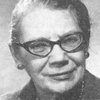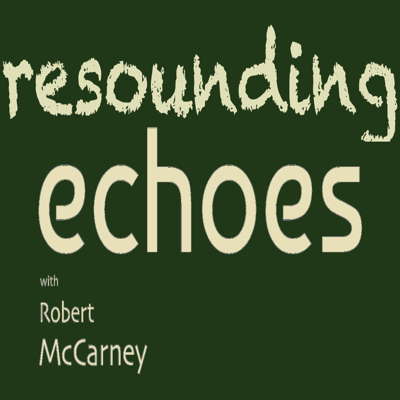From Live Performance to Live Streaming

ANETT FODOR continues her series of interviews with some of our era's most interesting artists, and today she talks to British pianist Leon McCawley about some of the new challenges to artistic life
Leon McCawley (born 1973) is one of Britain's most renowned pianists. He has won many significant international piano competitions and has released several notable recordings on CD. He has been a frequent soloist with many well-known orchestras all over the world.
I first came across Leon McCawley's recordings in 2018. I played his album constantly as I was so moved by his soft, eloquent Schubert interpretations. Since then I have been following his successful career closely.
The last several months have been extremely challenging for all musicians. Many concerts have been cancelled due to the worldwide pandemic. Suddenly, from one day to the next, performers' professional lives have become exceedingly precarious.
In my interview, I asked Leon McCawley about both the negative and positive effects of the COVID period, how his career began, how he gauges success and his plans for the future.
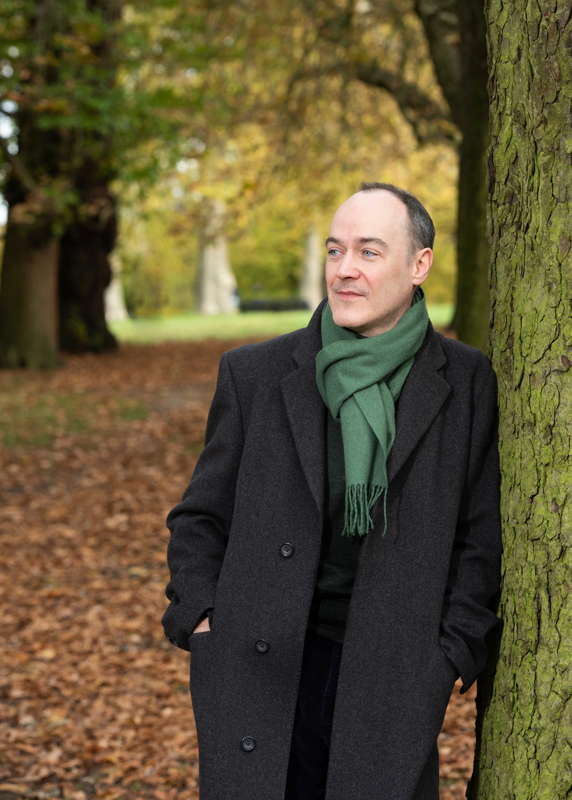
Leon McCawley. Photo © 2018 Sara Porter
Anett Fodor: When did you start playing the piano? Who discovered your talent? Did you like practising as a child?
Leon McCawley: I started to learn the piano when I was five years old, but I was already curious at around two years of age. My parents weren't musically trained but bought an upright piano for myself and my three sisters to play at home. We were brought up in a small village in Cheshire in North West England and we all took piano lessons with the local teacher. It was this teacher who soon realised that I had a natural talent for the piano and that I needed to receive more specialist training. Fortunately, at the recommendation of both my piano teacher and my recorder teacher (who had also recognised my musical ability) I auditioned for the Junior Royal Northern College of Music in Manchester and then subsequently for Chetham's School of Music, also in Manchester. I studied there with the most fantastic teacher, Heather Slade-Lipkin. She gave me the solid musical foundation that I would need to pursue a career in music. I loved playing the piano when I was small and all the more so because I wasn't obliged to practise in a particularly disciplined way. I was simply playing for my own enjoyment and sight-reading for fun. Once I had proper training, I was undeterred by the realisation that I would need to spend many concentrated hours at the piano. In fact I relished all the time I spent at the keyboard. My father would often tell me to stop practising so that I could get some fresh air and kick a ball about our garden, but the piano won most of the time!
AF: The most difficult thing for artists is to find their own style. How and when did you find it? Who inspired you most during your studies?
LM: Without the initial help and influence of Heather Slade-Lipkin in Manchester I may never have found my own artistic style. I am deeply indebted to her. That said, there's something quite instinctive I have always felt as a musician, something that is intrinsically my own, the way I feel music in my own personal way. It's perhaps due to the many hours I spent playing as a youngster reveling in a sense of freedom and abandon, but always with joy and love for the composers and the wonderful, varied repertoire we pianists are so lucky to have. The teachers I worked with later on - Eleanor Sokoloff at Curtis Institute of Music in Philadelphia and Nina Milkina when I moved to London in the late 1990s - were enormously inspirational in different ways: Eleanor Sokoloff for introducing me to the works of Schumann, which have become some of my most favourite repertoire to perform; and Nina Milkina for helping me understand the music of Mozart which again, is a life-long love.
AF: Many artists say the last seven months have been very difficult because they couldn't come face to face with their audience. Although this period has been quieter for artists such as yourself, you have been able to ponder, relax and study as well. How did the COVID period influence your career? Didn't it have a positive, not simply a negative effect upon your professional life?
LM: The last seven months have been enormously testing for all artists. Not to be able to perform live to an audience has felt almost like losing a limb: a part of me gone, or incomplete. The connection with the audience is vital to my way of playing and with that communication lost it has been so sad and unfulfilling. However, there have been possibilities to connect online and via livestreams which, although not quite the same, is better than nothing! In this day and age, we are so fortunate to have social media which has in some way softened the blow. After getting over the initial shock of losing all my concerts (and significant income) for the best part of 2020, I decided to make a few lockdown videos from my studio and the response from my fans and supporters on social media was really heartwarming. It gave me more belief and hope for the future. I was fortunate to be invited recently to give a recital at the Wigmore Hall, which really lifted my spirits. To be able to perform again felt like a new lease of life and made me realise just how much public performance is important to my life as a musician. There will be testing times ahead for 2021. Although most of my cancelled concerts have thankfully been rescheduled for 2021 and 2022, we still don't know for certain what will happen. Naturally, I will remain focused on my art and continue to study and teach.
AF: Your livestream recital at Wigmore Hall (10 October 2020) was your first public performance since March. The recital could be seen all over the world. Due to the pandemic there were fewer listeners in the auditorium than usual. Was it difficult to adapt to this situation?
LM: The international exposure from the livestreaming at the Wigmore Hall was a really wonderful opportunity. I was also really grateful for the small audience in the hall itself. Performing the recital as just a livestream to an empty hall would probably have been more difficult although everybody did look rather de-personalised wearing the mandatory mask. Performing at Wigmore is a very special experience and even though I was nervous before the event, once I walked out on stage, I felt the warmth of the audience and the incredible atmosphere of the hall, which itself inspired me.
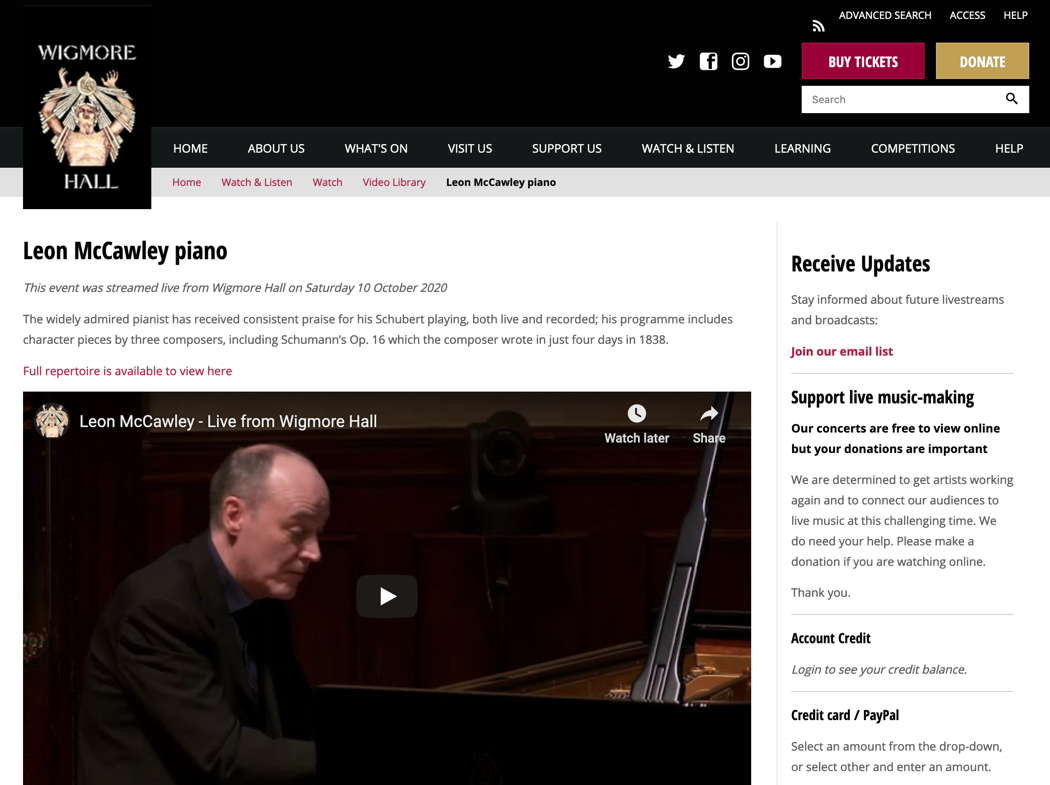
A screenshot of the web page for Leon McCawley's 10 October 2020 Wigmore Hall recital. The concert can be streamed from wigmore-hall.org.uk until 10 November 2020
AF: After a seven-month interval you played Schubert's A major Sonata D 664, Janáček's On an Overgrown Path Book 1 and Schumann's Kreisleriana Op 16. Why did you choose these works, when you started to give concerts again?
LM: The works were scheduled to be performed over the Spring in several recital venues, but as soon as I became aware of the cancellations I put them all 'to sleep' in my bookcase and felt incredibly depressed that I had been given only one chance to play the programme (in York, last February). Once I had the call from Wigmore in August that my cancelled April recital could now be rescheduled in October, I agreed to perform the same programme. I began to revisit the works immediately with great relief and happiness! It felt like reconnecting with old friends.
AF: You have performed and recorded many wonderful pieces, for instance, the complete cycle of Mozart piano sonatas, the complete piano works of Hans Gál, works of Chopin, Schumann, Schubert, Rachmaninov. Your ninth disc for SOMM, Haydn Sonatas Volume III, will be released on 20 November 2020. What inspired you to choose Haydn? Why is Haydn close to your heart? His piano sonatas are elegant and delicate, hence extremely difficult. How and how long did you prepare for your recordings?
LM: I love the music of Haydn: it is full of humour, joy, happiness and has great spirit. Even though there is often tragedy in his writing, optimism is the abounding mood. What perfect and ideal music to be playing during these gloomy days! I have been playing Haydn throughout my life as a musician and it's really wonderful to have the opportunity to be able to record many of the sonatas and explore this richly varied and inventive music. With regard to general recording preparation, I try as often as I can to link to concert performances of the repertoire so as to 'feel' the music in a concert hall setting. That can often change one's concept and understanding and allows the explorative process to grow even more. I always allow plenty of time and sometimes rest the repertoire to 'marinate' before I return to it again prior to the sessions. This year I have had more time to prepare due to the lack of concerts: one of the benefits of the lockdown, I imagine.
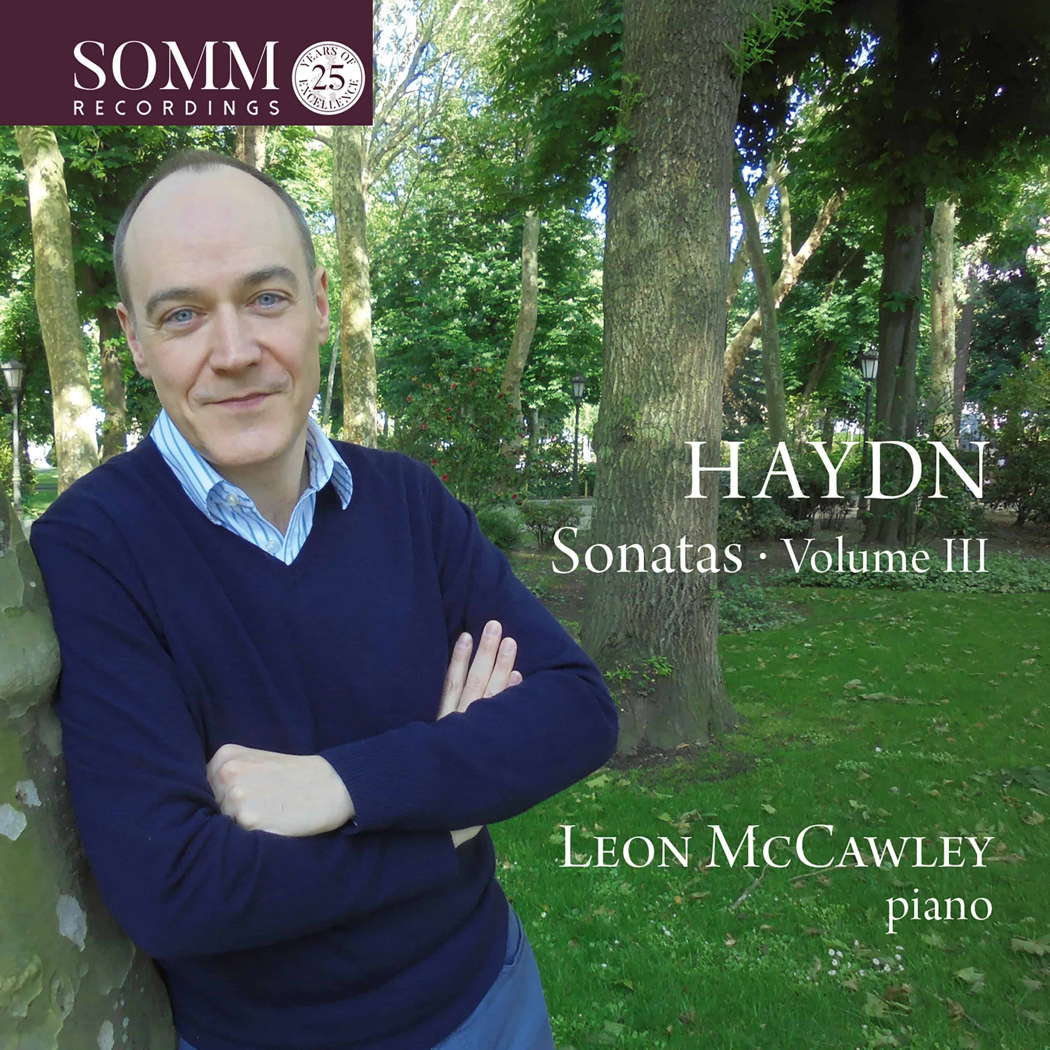
Haydn Sonatas Volume III. Leon McCawley, piano. © 2020 SOMM Recordings. This is the cover of the CD which is being released this month.
AF: You are a professor of piano at the Royal College of Music, London. What is the biggest challenge to teaching during these COVID days?
LM: During lockdown I was teaching all my students online. It was vital to maintain the connection. Fortunately, since September I have been able to teach the majority of my Royal College students face to face (wearing face masks) and only some are still online. Remote teaching has been challenging, but I decided to ask students to prepare a well-recorded video prior to online lessons for me to critique. At least that way we weren't wasting time dealing with the delays of an intermittent internet connection during the lessons themselves. My students have reacted very well to the changes and I have been really proud of their work. I hope very much that we can continue with face to face lessons at Royal College of Music for the rest of the year.
AF: What does success mean to you?
LM: It means achieving your own personal and artistic goals and that doesn't necessarily imply the long-term. When I was younger, I was constantly comparing and gauging myself to the great piano masters of the past as well as my fellow musicians' successes ie achieving high profile concerts, receiving accolades etc. Equating success with making comparisons to others in your own field is really unhealthy. We all make our own path in life. Success can be of any size: at the moment simple daily success can bring rewards (and happiness) and I now try my best to look at my life from that perspective.
AF: What are your future plans?
LM: After the release of my Haydn Sonatas Volume III for SOMM in November I will be back in the studio this December to record the fourth volume of Haydn Sonatas with SOMM. I am also preparing for my 2021 recitals which will all, fingers crossed and God willing, go to plan. My general plan always, is to improve as a musician, to go deeper into the music with both imagination and empathy. That will be a life-long vocation, for sure!
AF: What do you do when you are not practising? What are your hobbies?
LM: When I'm not practising or teaching, I enjoy going for walks in the park and the countryside, visiting art galleries, museums and travelling. My wife is an artist, so I am very much inspired by her art of still-life paintings, landscapes and figurative work. We both have studios at home. I also enjoy cooking, particularly Italian cuisine, which is my favourite. In wintertime though, here in London, comforting traditional English stews, casseroles and roasts are perfect to counteract the cold wet weather. I also love drinking wine - who doesn't?!
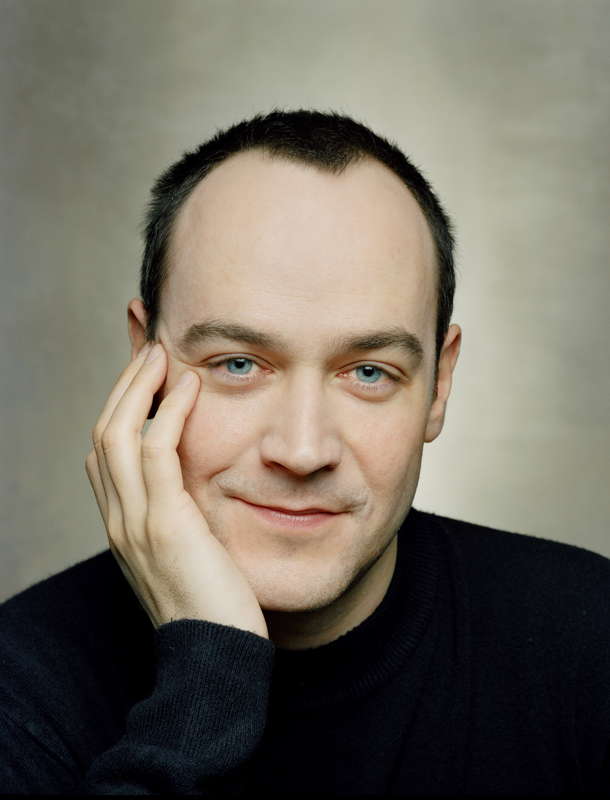
Leon McCawley. Photo © 2006 Sheila Rock
AF: Would you like to say something to listeners and readers?
LM: Firstly, thank you for reading this interview all the way to the end: you've been patient! Do try and listen to classical music every day as it will lift your spirits during these dark days. If you are in the mood for some piano music, please take a look and listen to the various uploads on my YouTube channel - and kindly support me by subscribing!
Copyright © 8 November 2020
Anett Fodor,
Győr-Moson-Sopron, Hungary

FURTHER INFORMATION: LEON McCAWLEY
FURTHER INTERVIEWS, PROFILES AND TRIBUTES
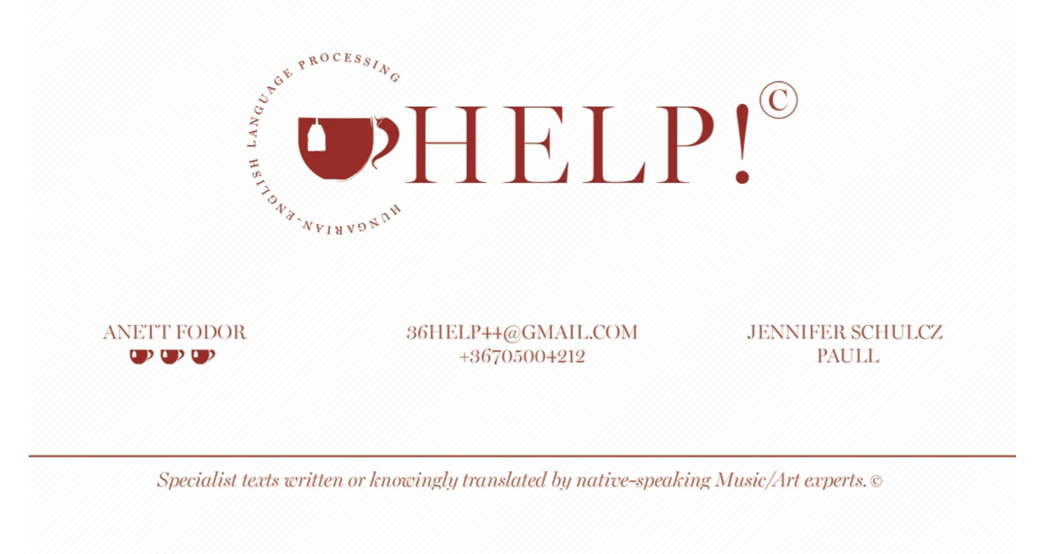
Advertisement


